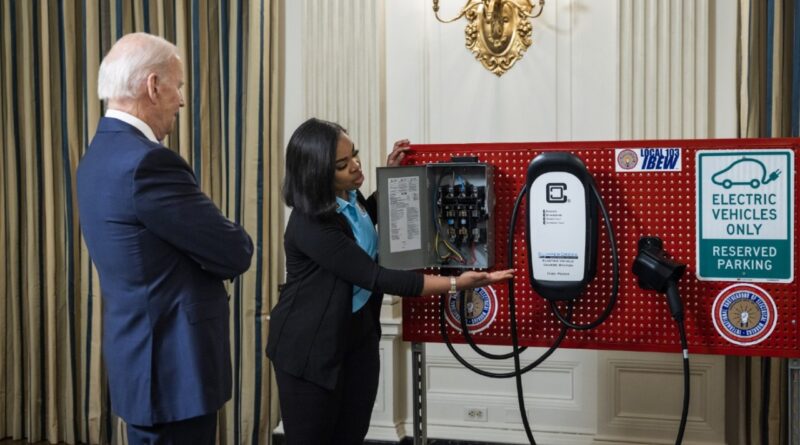Conflict with trade regulations are speed bumps for Biden’s EV goals
President Biden wants Americans to switch from gas-powered cars to electric cars, but his vague trade policies and too few trade agreements make that difficult.
The Biden administration sees widespread adoption of the electric vehicle (EV) as critical to combating climate change and achieving a sustainable future. In an effort to ensure that future, the Environmental Protection Agency recently proposed a new emissions rule that says gas-powered vehicles should make up no more than 30 percent of vehicle sales by 2032. .
That will be a real challenge. The EV share of new vehicle sales was 7.3 percent in the first quarter of 2024, down from 7.8 percent in the fourth quarter of 2023. The industry is seeing a slowdown in EV sales growth.
If widespread EV adoption is a priority, then America’s business policies, some of which Biden inherited and some of which are his own, need another look. Because now, it’s a big race.
Many Americans are hesitant to adopt electric vehicles due to concerns about reliable charging options, the initial purchase price and other concerns. Addressing them will be critical to growing the EV market. International business can help Biden achieve that goal. But it needs to go back to the basics, including congressionally-authorized free trade agreements.
The Affordable Care Act requires that key minerals in EV batteries be sourced domestically or from free trade partners. The existing law is not clear on who exactly these partners are. Until now, the administration has been pursuing important mineral agreements with the understanding that participating countries qualify as free trade agreement partners as far as the law goes.
These agreements aim to help US automakers create competitive EV supply chains. The United States has signed an important mineral agreement with Japan. Negotiations with the European Union, the United Kingdom and Indonesia are ongoing.
But a new bill that has just been proposed will put a damper on those discussions. The House Ways and Means Committee recently passed HR 7983, the “Stop Executive Overreach on Trade Agreements Act.”
Proponents of the bill say it’s time for Congress to assert its constitutional authority over trade policy, and that the act would “protect Congress’s role by definition. [a free trade agreement] being an international agreement approved by Congress and eliminating restrictions on all trade with a partner. “
With all the world’s trade laws, restrictions and requirements on the content of precious minerals and battery components, the ambiguity surrounding what constitutes a free trade agreement partner creates a real problem. to be resolved. As the Center for Strategic and International Studies’ Bill Reinsch said, “This is not an idle exercise in semantics.”
No one wants to enter into a long-term resource agreement with a mining or refining company when the contractual agreements can be suddenly destroyed by the next political opinion. It’s time to get to work because private sector firms and investors must trust that a secure deal will be in place for the long term. A congressionally approved free trade agreement lasts longer than an independent mineral agreement.
The United States has free trade agreements with other countries that are major exporters of minerals, such as Chile and Australia. But other nations, such as The Philippines and Indonesia, have mineral or refining capacity to contribute and want to be integrated into our supply chains. A common trade agreement that lowers trade costs and covers many goods, including minerals, could help North American automakers build an efficient EV supply chain.
If EV adoption is a priority for the Biden administration, it would help to find ways to use the free trade agreements allowed to make that happen.
Christine McDaniel is a senior researcher with the Mercatus Center at George Mason University.
Copyright 2024 Nexstar Media Inc. All rights reserved. This content may not be published, published, rewritten or redistributed.
#Conflict #trade #regulations #speed #bumps #Bidens #goals
